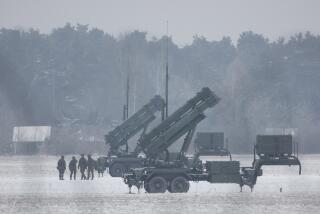Cost of $1.95 Billion for Each B-2 Held Possible : Defense: The price would soar if fewer are built and procurement is extended, a congressional report says. Cancellation would save $45 billion.
- Share via
WASHINGTON — The controversial B-2 Stealth bomber could cost as much as $1.95 billion per plane if the government reduces the overall number to be built and stretches out procurement, the Congressional Budget Office has reported in a study to be released today.
That estimate was based on purchasing a total of 33 planes at a rate of two per year.
The immediate cancellation of the program, however, would reap a savings of $45 billion. That option would leave a force of 16 bombers with price tags of $2 billion each, the Capitol Hill budget analysts have told lawmakers.
Those figures, to be released today by Sen. Alan Cranston (D-Calif.), highlight the painful choices that Congress and the Pentagon must make if, in order to save money, they alter the original plan to build 132 planes for $75 billion, at a cost of $570 million each.
If fewer planes are built, each one is more expensive because many costs, such as research and development, are fixed.
Cranston, who is leading the Senate fight to halt production of the Stealth bomber this year, cited the CBO report in support of his drive.
“The CBO report confirms what I have been saying all along,” Cranston said Tuesday. “The only way to stop wasting money on the B-2 program is to kill it outright--not a slice at a time, but once and for all.”
However, proponents of the B-2 bomber also will use the CBO report to bolster their argument that the program should not be cut. The planes are built in Southern California by Northrop Corp.
“You pay some penalty if you slow the program. And, if you build a smaller force, the unit cost goes up,” said an aide to Rep. Norm Dicks (D-Wash.), a leading proponent of the bomber.
On Tuesday, Air Force Secretary Donald B. Rice told one Senate panel that the Bush Administration is considering scaling back its proposed production schedule for building 132 planes between now and 1996.
The current schedule calls for building a different number each year, with a peak level of 30 slated for 1995. But the Pentagon has been under intense pressure from Congress to cut the program.
Rice, in his first public comments on a Pentagon review of major weapons systems, told members of the Senate Defense Appropriations subcommittee that the Pentagon believes there are alternative production schedules for the B-2 that will have a “very modest effect on the total cost of the program.”
He said the Air Force is proposing funding levels that would cap the program at “several billion dollars a year less than (the) peak funding level” of close to $10 billion.
The Air Force secretary conceded that it will be difficult to persuade Congress to spend almost $10 billion a year on a single weapons program. But he said such a pace represents the most efficient production rate.
The B-2 bomber uses special materials, coatings and design features to elude detection by enemy radar. Critics have lambasted the plane as the most expensive ever built and said that its mission--to penetrate Soviet air defenses and attack mobile targets with nuclear weapons--is unnecessary and provocative.
The Air Force proposal was drawn up in response to lawmakers’ complaints about the high cost of the program.
“It’s an impossible proposition,” said Rep. Les Aspin (D-Wis.), chairman of the House Armed Services Committee when presented last year with the Bush Administration’s proposed production schedule for the B-2.
“They must be smoking something over there if anybody thinks that we’re going to spend $8 billion (to $10 billion) in one year on a single weapons program.”
“There is no good price for the B-2 bomber,” Rep. Dave McCurdy (D-Okla.), a member of the House Armed Services Committee, said recently of the dilemma.
The CBO report suggested that, if production of the 132 planes is stretched out so that yearly program costs peak below $10 billion, the cost of the entire fleet would rise to $85 billion.
Defense Secretary Dick Cheney is expected this week to receive the findings of the Pentagon panel reviewing the B-2 and four other major aircraft programs.
Cheney has said that, as a result of the review, he may scale back the B-2 program. But, in prior decisions, Cheney has refused to “stretch” production of the B-2 in such a way that it would increase the overall cost of the program.
More to Read
Sign up for Essential California
The most important California stories and recommendations in your inbox every morning.
You may occasionally receive promotional content from the Los Angeles Times.











